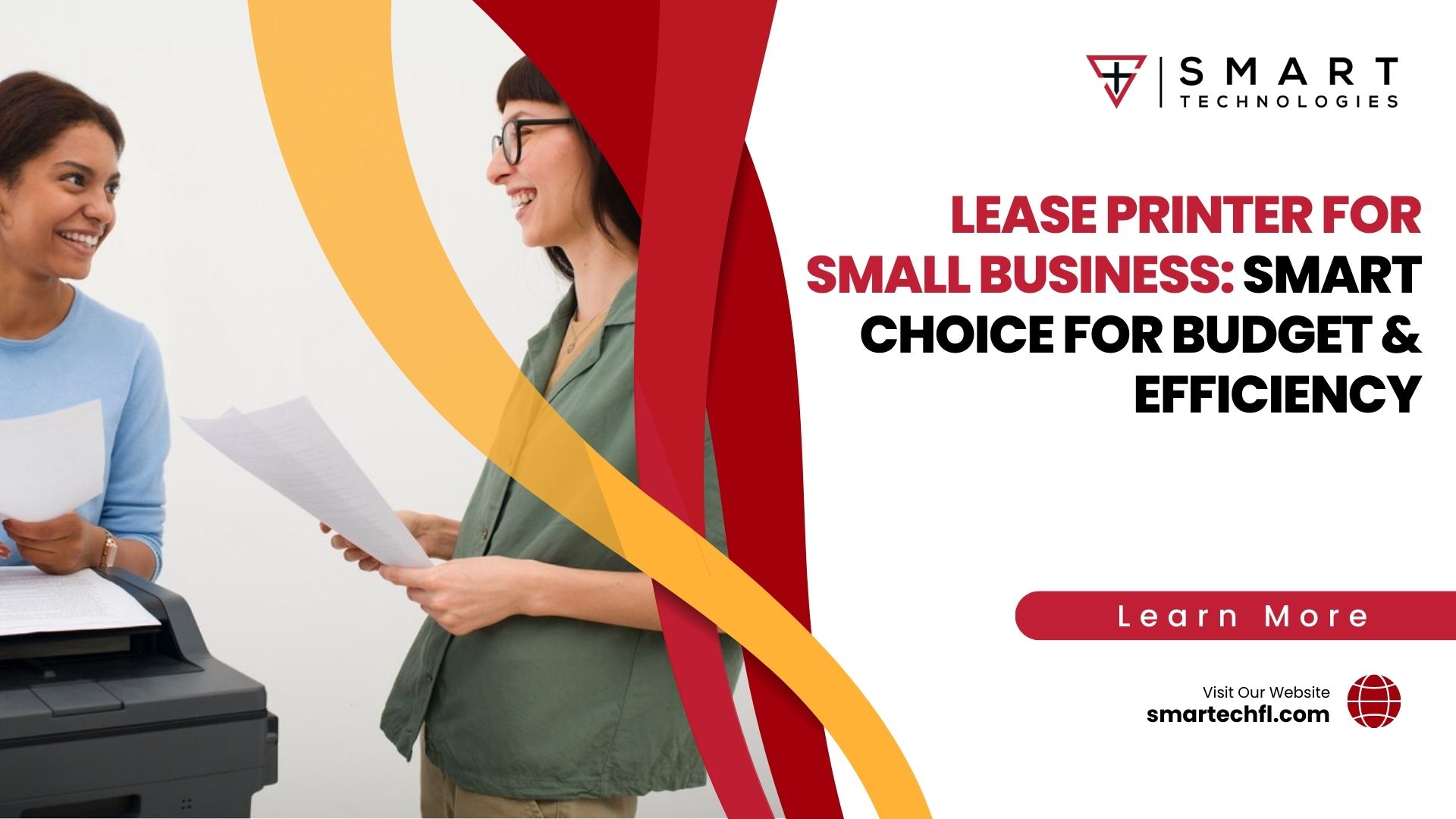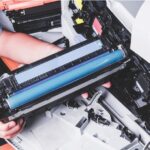Online Copier Leasing Made It Easy
Online Copier Leasing Made It Easy
In today’s fast-paced business environment, staying up-to-date with the latest technology and managing operational expenses are crucial for success. One aspect that plays a significant role in achieving these goals is copier leasing. Copier leasing is a financial arrangement that enables a business to obtain a cutting-edge copier without the need for a substantial initial investment. Instead, companies pay a fixed monthly lease fee for the use of the copier over a specified period. This lease arrangement not only makes the latest copying technology accessible to businesses of all sizes but also provides numerous benefits such as improved budget management, tax advantages, and flexibility to adapt to changing needs. Together we will delve deeper into copier leasing and explore its importance to businesses in maintaining a competitive edge and enhancing operational efficiency.

The Advantages of Copier Leasing
Copier leasing offers a range of benefits for businesses, making copier leases an attractive option when considering office equipment needs. Some of the key advantages of copier leasing include:
Lower upfront copier costs, Potentially Fixed Purchase Rate
One of the main benefits of copier leasing is that it allows businesses to acquire a copier without making a significant upfront copier investment. Purchasing a copier outright can be expensive, and leasing provides an alternative solution that helps businesses conserve their capital for other crucial expenses or investments.
Predictable monthly copier lease payments
Copier leasing agreements usually involve fixed monthly payments, making it easier for businesses to budget their expenses. This predictability enables companies to allocate resources more effectively and manage their cash flow efficiently, reducing financial strain and uncertainty.
Copier Tax benefits
In many cases, the lease payments for a copier can be considered an operating expense and may be tax-deductible. This can help businesses reduce their taxable income, potentially resulting in significant tax savings. It is essential to consult a tax professional to fully understand the tax implications of leasing a copier for your specific situation.
Access to newer Copier technology
Technology is continually evolving, and staying up-to-date with the latest advancements is crucial for businesses to remain competitive. Copier leasing allows companies to upgrade to newer models with advanced features and capabilities at the end of the lease term. This ensures that businesses always have access to the most current technology, which can improve efficiency and productivity.
Copier leasing offers numerous benefits to businesses, including lower upfront costs, predictable monthly payments, tax advantages, and access to the latest technology. By choosing to lease a copier, companies can effectively manage their expenses while staying up-to-date with the rapidly changing technological landscape.
Disadvantages of Copier Leasing
While copier leasing provides several benefits to businesses, it also comes with a few disadvantages that should be considered before making a lease decision. Some of the potential drawbacks of copier leasing include
The higher overall cost of copiers
Although copier leasing eliminates the need for a large upfront investment, the overall cost of leasing can be higher than purchasing a copier outright. Over the duration of the lease, the monthly lease payments may add up to an amount that exceeds the initial cost of buying the copier. Businesses should carefully evaluate their long-term financial situation and determine whether leasing or purchasing is the most cost-effective option for them.
Contractual obligations of copier leases and potential penalties
Copier lease agreements often come with strict contractual obligations, which may include penalties for early termination or changes to the lease terms. If a business needs to end the lease early, it could face significant costs, which could negate some of the financial benefits of leasing. It is essential to thoroughly review the lease agreement and understand all terms and conditions before signing.
Limited customization options
Leased copiers may have limited customization options compared to purchasing a copier outright. Businesses may be restricted to the available models and features offered by the leasing company, which might not perfectly align with their specific requirements. Additionally, making modifications or upgrades to the leased equipment might not be allowed or could come with additional costs.
While copier leasing offers several advantages such as lower upfront costs, predictable monthly payments, and access to the latest technology, businesses should also consider the potential disadvantages, including higher overall costs, contractual obligations, and limited customization options. By weighing the pros and cons, companies can make an informed decision that best suits their needs and budget.
Things to Consider
When considering leasing a copier, there are several factors that businesses should take into account to ensure they select the best possible option for their specific needs. These factors include:
Monthly lease payments
One of the primary factors to consider is the monthly lease payment. Businesses should carefully review their budget and determine how much they can afford to spend on a copier lease. It is essential to compare multiple leasing offers to find the most competitive rates and terms that align with the company’s financial capabilities.
Lease term and end-of-lease options
The lease term is another critical aspect to consider. Lease terms can range from short-term (12-24 months) to long-term (48-60 months) agreements. Longer lease terms generally result in lower monthly payments but may also increase the overall cost of the lease. Additionally, businesses should review the end-of-lease options, such as the ability to purchase the copier at a reduced price, upgrade to a newer model, or simply return the equipment.
Maintenance and repair costs
Copiers, like any other office equipment, require regular maintenance and may occasionally need repairs. It’s essential to understand the maintenance and repair costs associated with the leased copier and whether these costs are covered under the lease agreement. Some leasing companies may include a service agreement that covers routine maintenance and repairs, while others may charge additional lease fees for these services.
Customer support and service agreements
Reliable customer support is crucial when leasing a copier. Businesses should evaluate the level of customer support provided by the copier leasing company, including copier issue response times, copier technician availability, and the quality of copier service. It is also essential to review the service and lease agreement to understand the terms and conditions for maintenance, repairs, and support. A comprehensive lease service agreement can help minimize downtime and ensure that the copier remains in optimal working condition throughout the lease term.
When leasing a copier, businesses should carefully consider factors such as monthly lease payments, lease terms, maintenance and repair costs, and customer support. By thoroughly evaluating these factors and comparing multiple leasing offers, companies can make an informed decision that best meets their needs and budget.
Pros VS Cons
Leasing and buying a copier outright each have its unique advantages and disadvantages. To determine the best option for your business, it’s essential to compare the pros and cons of both approaches.
Leasing a copier
Pros
- Lower upfront costs: Leasing a copier requires a smaller initial investment compared to purchasing one outright, allowing businesses to allocate resources to other essential areas.
- Predictable monthly payments: Leasing offers predictable monthly payments, making it easier for businesses to budget and manage expenses.
- Tax benefits: Lease payments may be tax-deductible as a business expense, reducing the overall cost of leasing.
- Access to newer technology: Leasing enables businesses to upgrade to the latest technology more frequently, ensuring they have access to the most advanced features and capabilities.
Cons
- Higher overall cost: Over the long term, the total cost of leasing can be higher than purchasing a copier outright due to the accumulated monthly payments.
- Contractual obligations: Lease agreements may have strict terms and conditions, including penalties for early termination or changes to the lease terms.
- Limited customization options: Leased copiers may have limited customization options, and making modifications or upgrades to the equipment might be restricted or involve additional costs.
Buying a copier outright
Pros
Total ownership: Purchasing a copier gives businesses full control over the equipment, allowing them to customize and make modifications as needed.
Lower long-term cost: In the long run, buying a copier outright may be more cost-effective, as there are no ongoing monthly payments.
No contractual obligations: Owning a copier eliminates the need to adhere to contractual terms and conditions, providing greater flexibility in using and maintaining the equipment.
Cons
Higher upfront cost: Purchasing a copier requires a significant initial investment, which may strain a business’s budget.
Responsibility for maintenance and repairs: When owning a copier, businesses are responsible for all maintenance and repair costs, which can add up over time.
Potential obsolescence: As technology advances, a purchased copier may become outdated more quickly, requiring additional investments to upgrade or replace the equipment.
In conclusion, leasing a copier offers advantages such as lower upfront costs, predictable monthly payments, and access to newer technology. On the other hand, buying a copier outright provides total ownership, potentially lower long-term costs, and no contractual obligations. Businesses should carefully consider the pros and cons of both options and evaluate their specific needs, budget, and long-term plans before deciding whether to lease or purchase a copier.
Overall, copier leasing offers a practical and flexible solution for businesses looking to acquire advanced copying technology without a substantial upfront investment. The benefits of a lease, such as predictable monthly lease payments, tax advantages, and access to the latest technology, make it a lease attractive option for many organizations. However, it’s essential to weigh the potential drawbacks, such as higher overall costs and contractual obligations of the lease, against the advantages.
By carefully considering lease factors such as monthly lease payments, lease terms, maintenance and repair costs, and customer support, businesses can make an informed decision about whether copier leasing is the right choice for them. Ultimately, the decision to lease or purchase a copier outright depends on a company’s unique requirements, financial situation, and long-term goals. Evaluating both options and their respective pros and cons will help businesses make the best decision to suit their specific needs.











